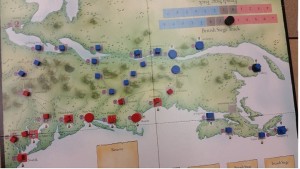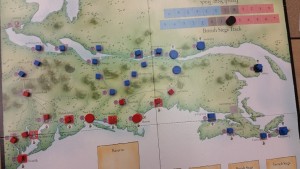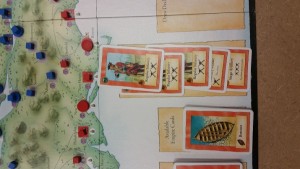The game begins with both the French and the British army’s occupying land on each side of the island. The French control multiple forts on the Canadian side of the island and the British are controlling an isolated number of forts on the opposite side. The amount of territory each side starts with is about the same, and from here the goal is to occupy as much territory as possible.

This is what the board looks like at the beginning of the game both sides occupying seven different cities
This is what the board looks like at the beginning of the game both sides occupying seven different cities. From here the goal is to either siege the city at the heart of opponent’s territory. The city to take from the French to win is Quebec it is the city marked by the blue circular piece on the left. If the French were to siege either of the cities marked by red circles they would win. This is one way to win and it requires a large army to siege territory along the way as well as the city itself. In this game the British decided to use this strategy. The British have more money and more ability to earn money making a large army easier to build. The British began occupying territory with the more territory owned the more money they will make. Occupying territory and saving money waiting on the chance to move on Quebec. The more land you own the more cards you have at your disposal. Cards allow you to take cities you may need to work toward Quebec or new cities to earn money and items you will need. In this case the British worked around the island conquering cities and forts they needed along the way to reach Quebec. Each city sacrificing military that will need to be replenished to move on.
This is a large army that would be ready to attack any city on the board. These cards can be bought and this is the army the British had in order to take the first large city on their way to Quebec. Halifax, a city near there largest fort on the coast Halifax fell fast and once the army is rebuilt Quebec will only be two steps away.
The French on the other hand are attempting to win the game by occupying as much territory as possible. When a player has occupied a set number of cities which is a large majority they win the game. With the resources the French have occupying territory in much easier for them. The British have a military advantage and the French have this advantage. So the French decide to do so. Starting with seven cities across the board they will grow outward from there utilizing boats carriages and even large ships they will take as much territory as possible fortifying the most important ones along the way the hinder the British from easily taking it over.
From here it is a race to who wins first. The British continue stockpiling their military cards and moving into a position to attack Quebec. While the French move to city to city occupying each and trying to establish an overwhelming presence. Each move is a strategic thought in either achieving this goal or slowing the opponent from achieving their goal
The game advanced with the British working west around the island sieging French territory with the overwhelming ability to raise an army. The French continued occupying all cities they could while fortifying cities the British will need.
In the end the game ended when the French occupied all the land they could putting the territory in the hands of the French.

In the end the game ended when the French occupied all the land they could putting the territory in the hands of the French
If you will notice the two large forts on the right side of the board occupied by the blue French pieces and fortified with the circular pieces one black one blue. This was able to hold off two attempts by the British to siege this land in an attempt to have a connection to Quebec. Successfully holding off the British long enough to occupy all of the cities marked in blue giving them enough cities to successfully win the game.
Chris Reardon, 5/19/2015
